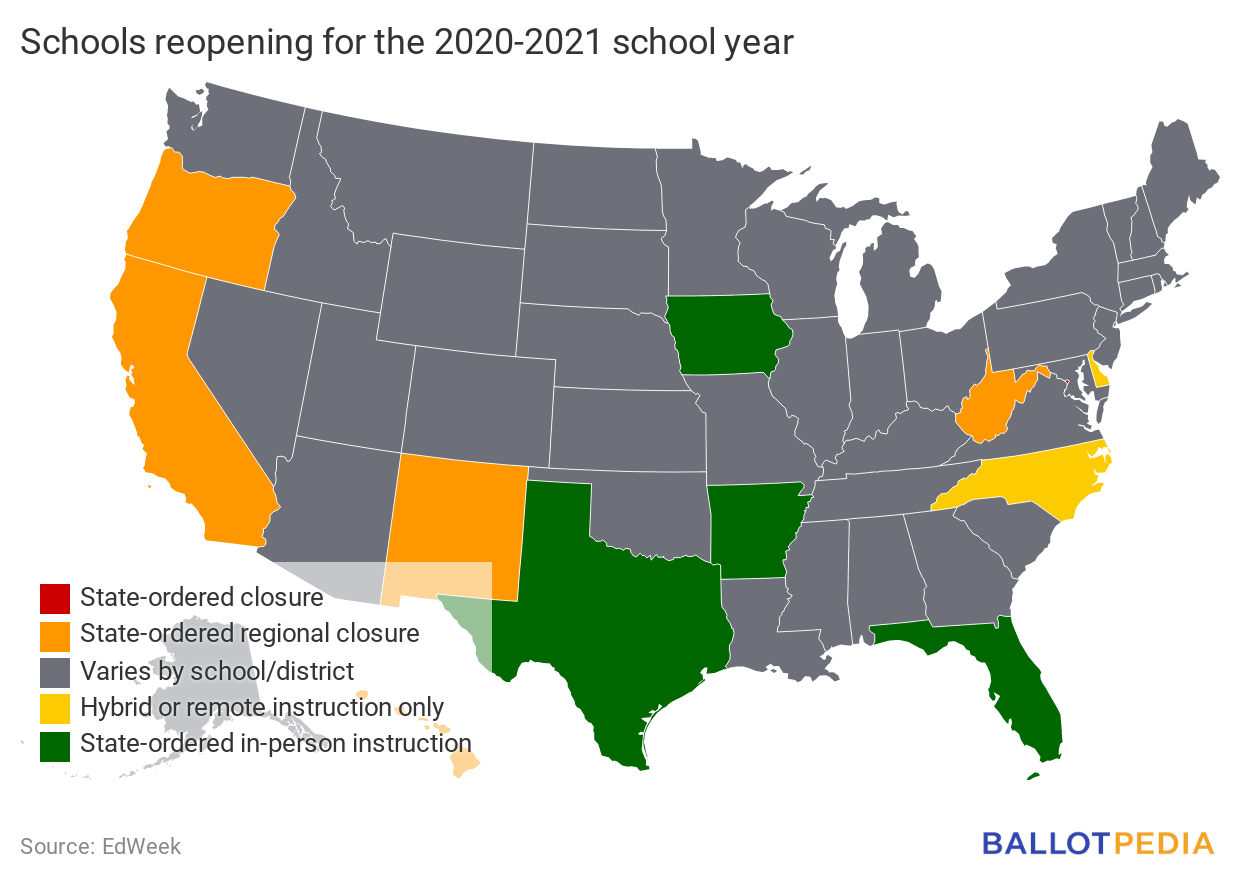Welcome to Documenting America’s Path to Recovery, where we track the status of reopening in all 50 states. Today we look at outdoor venue reopenings in North Carolina, the easing of international travel restrictions in North Dakota, school reopenings, and more. Want to know what happened yesterday? Click here.
Since our last edition
What is open in each state? For a continually updated article on reopening status in all 50 states, click here.
- Connecticut (Democratic trifecta): Gov. Ned Lamont (D) announced the formation of a new advisory group to prepare the state for the distribution of an eventual COVID-19 vaccine. The co-chairs of the group are Dr. Deidre Gifford, the acting commissioner of public health, and Dr. Reggie Eadie, president and CEO of Trinity Health of New England.
- New Hampshire (divided government): Gov. Chris Sununu (R) signed an executive order extending the state of Emergency for an additional 21 days.
- North Carolina (divided government): Gov. Roy Cooper (D) announced that beginning Oct. 2, large outdoor venues with a capacity of more than 10,000 may reopen at 7% capacity. The change only applies to venues with seats and not large open areas.
- North Dakota (Republican trifecta): North Dakota Interim State Health Officer Dr. Paul Mariani announced that North Dakotans traveling internationally were no longer required to self-quarantine for 14 days after returning home.
- Washington (Democratic trifecta): Gov. Jay Inslee (D) announced agritourism activities (like hayrides, corn mazes, and pumpkin patches) can reopen in Modified Phase 1 counties if they comply with Phase 2 requirements for the industry.
- Wisconsin (divided government): Gov. Tony Evers (D) extended the state’s mask requirement and public health emergency through Nov. 21.
Daily feature: Schools
All 50 states closed schools to in-person instruction at some point during the 2019-2020 academic year. Beginning in May 2020, schools in certain states began to reopen. In which states are schools allowed to open? In which states are they ordered to remain closed?
The current status of school reopenings is as follows:
- Washington, D.C., has a district-ordered school closure
- 2016-17 enrollment: 85,850 students (0.17% of students nationwide)
- Five states (Calif., Hawaii, N.M., Ore., W.V.) have a state-ordered regional school closure
- 2016-17 enrollment: 7,679,753 students (15.18% of students nationwide)
- Two states (Del., N.C.) are open for hybrid or remote instruction only
- 2016-17 enrollment: 1,686,326 students (3.33% of students nationwide)
- Four states (Ark., Fla.*, Iowa, Texas) have state-ordered in-person instruction
- 2016-17 enrollment: 9,180,918 students (18.15% of students nationwide)
- *Note: Three counties in South Florida are not at the same phase of reopening as the rest of the state and are not affected by the emergency order to open schools.
- Thirty-nine states have reopenings that vary by school or district
- 2016-17 enrollment: 31,955,012 students (63.17% of students nationwide)

|
Additional activity
In this section, we feature examples of other federal, state, and local government activity, private industry responses, and lawsuits related to the pandemic.
- Miami-Dade County Public Schools Superintendent Alberto Carvalho proposed a staggered school reopening plan that would return in-person learning beginning Sept. 30. On Sept. 30, students in pre-k through 1st grade and those with special needs would begin in-person instruction. Grades 2-6 and 9-10 would return on Oct. 5, followed by grades 7-8 and 11-12 on Oct. 7.
- On Sept. 16, a University of Washington (UW) student filed a class-action lawsuit seeking tuition reimbursement for campus closures. In the complaint, filed in King County Superior Court, UW graduate student Alexander Barry argues that “[d]espite sending students home, transitioning to online instruction, and closing its campuses, the University of Washington continued to charge for tuition … as if nothing changed, continuing to reap the financial benefit of millions of dollars from students.” The suit alleges the university’s “failure to provide in-person instruction and shutdown of campus facilities amounts to a material breach of the contract.” The complaint alleges that contract law, constitutional guarantees, and “good conscience require that the University of Washington return a portion of the monies paid in tuition and fees.” In a statement, UW representative Victor Balta said university officials “understand and share the frustration and disappointment that students and their families are experiencing as we navigate the unprecedented limitations presented by the COVID-19 pandemic,” but declined to comment directly on the pending litigation. The judge assigned to the case has yet to be announced.
|


